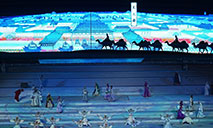Washington's "diplomacy by deception" only sabotages world peace
BEIJING, Oct. 23 (Xinhua) -- In the U.S. Senate's confirmation hearing on Wednesday, Nicholas Burns, the nominee for the post of U.S. ambassador to China, appeared as a China hardliner by throwing dirt on the country.
His testimony, to some extent, was seen as posturing in the face of pressure from Republican senators. Given the politics of deception prevailing in Washington, it is comprehensible why an experienced career diplomat has to smear his future host country to get an official appointment.
Obviously, that political tradition has steered U.S. foreign policies into a wrong direction -- the "diplomacy of deception."
SABOTEUR DISGUISED AS SAVIOR
Burns' testimony involved issues regarding China's Xinjiang, Tibet, Hong Kong, and Taiwan. Calling China "the greatest threat to the security of our country," he urged to "maintain the American military position" in the Asia-Pacific, referring to the U.S. presence as an "effective deterrent to keep the peace."
However, as the biggest arms exporter, military spender and regime changer of the world, the United States itself was widely regarded as the biggest threat to world peace, according to polls conducted by WIN/Gallup International and Pew Research Center.

Iraqi protesters take part in a demonstration against the presence of U.S. troops in the country in Baghdad, capital of Iraq, Jan. 24, 2020. (Xinhua/Khalil Dawood)
In 2003, then U.S. Secretary of State Colin Powell, who died of COVID-19 complications earlier this week, lied to the world that Iraq possessed weapons of mass destruction, and paved the way for the Iraq War.
Actually, intelligence officials repeatedly cautioned the war was based on conjecture, since a British inquiry disclosed that one report's description of Iraqi chemical weapons was excerpted from "The Rock," an action movie directed by Michael Bay.
To justify its rising belligerence and imperialism, Washington has woven numerous embarrassing narratives.
In mid-June, for example, the United States financed anti-Cuba forces to incite demonstrations by spreading the rumor that the spike of COVID-19 infections had led to a medical collapse in Cuba, whereas the United States is actually the worst-affected by the pandemic in terms of cases and deaths.
Should the current U.S. administration continue to accumulate more lies and atrocities, "it will not be able to regain the world's respect for American leadership, nor will it win the American public's support for its foreign policy," wrote Medea Benjamin, co-founder of Code Pink, a U.S. anti-war group, and Nicholas Davis, a researcher with the group, in an article.
CHINA'S COMMITMENT TO PEACE
China has committed itself to be a builder of world peace, a contributor to global development, a defender of the international order and a provider of public goods, making Washington's accusations sound ridiculous.
Since 1949, China has upheld "a national defense policy that is defensive in nature." "Never seeking hegemony, expansion, or spheres of influence" is the distinctive feature of China's national defense, said a white paper released by the Chinese government.
While building its defense strength for national security, China is also championing global peace through multilateral mechanisms. Over the past 30 years, some 40,000 Chinese peacekeepers have been dispatched to conflict-affected countries and areas in 25 UN operations.
Echoing the zeitgeist that all nations, no matter big or small, enjoy equal rights, the China-proposed Belt and Road Initiative has set an example that a big nation like China can cooperate with "nations across Southeast Asia, South America, Africa, and treat them as equal partners, because the process is win-win," said Richard A. Black, the Schiller Institute's representative at the UN.
The Maritime Silk Road, one of the two arms of the initiative that connected continents and brought development opportunities, is extremely important for world peace, Black told Xinhua in August.

Aerial photo taken on July 24, 2020 shows the China-Laos Railway's Ban Ladhan Mekong River Super Major Bridge in Laos. (Photo by Pan Longzhu/Xinhua)
At the Cambridge Forum in 2018, when asked about his views on China's investment projects overseas, former Greek Finance Minister Yanis Varoufakis said that China is "far more humanistic than the United States ever was," as the Asian country, which is "non-interventionist in a way that Europeans, the West, have never managed to fathom," has no "military ambitions."
HARD TIMES DEMAND COOPERATION
Given the haunting common challenges facing humankind, such as climate change, sustainable development and recovery from a once-in-a-century pandemic, Washington's ambiguous stance towards the U.S.-China relationship is worrisome.
The approach to deal with the different issues with China separately, or "compartmentalization," only blew the lid off of Washington's arrogance and insincerity. Never can practical cooperation take place in parallel with competition or confrontation.
For the two largest economies, their cooperation will lead to benefits in both countries and beyond, while their confrontation will cause suffering worldwide.

A container ship of China's COSCO Shipping docks at a new container terminal of the Port of Long Beach in California, the United States, Aug. 20, 2021. (Xinhua/Gao Shan)
In response to Burns' remarks, Wang Wenbin, a spokesperson of the Chinese Foreign Ministry, on Thursday urged him to "be keenly aware of the overall trend of world development and people's aspiration, learn the real situation of China objectively, (and) view China and China-U.S. ties in a rational manner."
"We hope he will speak and act in a more constructive manner, and play a constructive part in promoting China-U.S. relations and the friendship between the two peoples," Wang said.
Meanwhile, Wang reiterated that "we oppose defining China-U.S. ties as competitive. Even when there is competition between the two sides in such pragmatic areas as economy and trade, it is healthy competition with each other for excellence."
Photos
Related Stories
- China contributes to world peace, development by achieving moderate prosperity: white paper
- Commentary: Chinese military: determined defender of world peace
- Chinese military staunch force for world peace, stability: official
- China a champion of world peace, defender of int'l order: Chinese VP
- China calls for more equitable, stable int'l order
- Top political advisor calls on religious organization to promote world peace
- Xi says China stays committed to upholding world peace
- China's endeavor of promoting world peace, development always on the way: envoy
- Religious organization urged to promote world peace
- China, EU's cooperation makes contribution to world peace: Xi
Copyright © 2021 People's Daily Online. All Rights Reserved.










